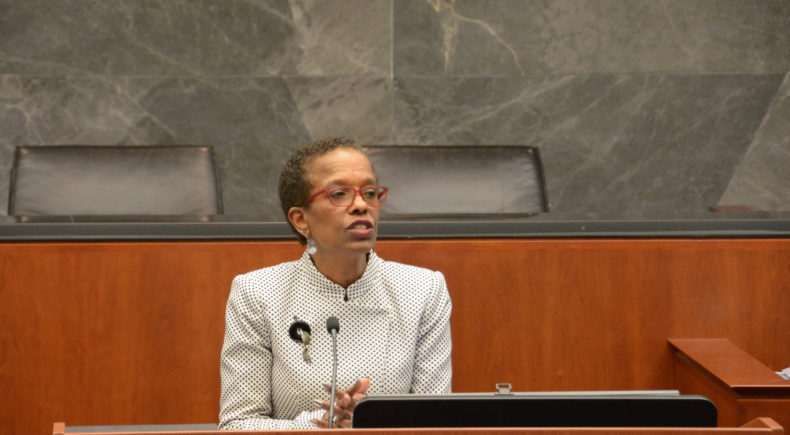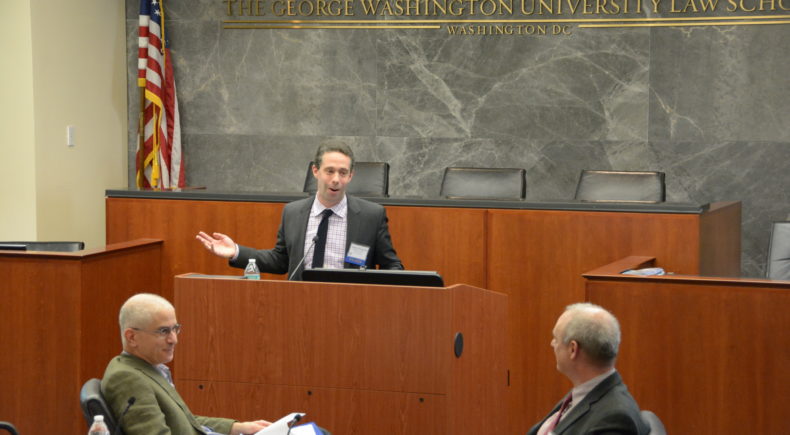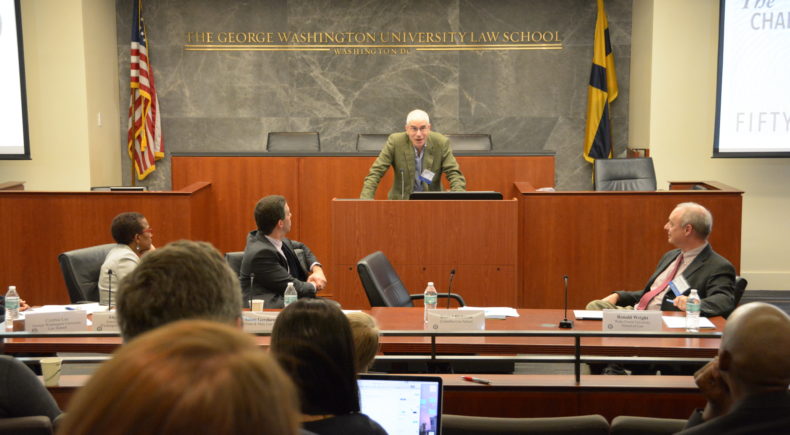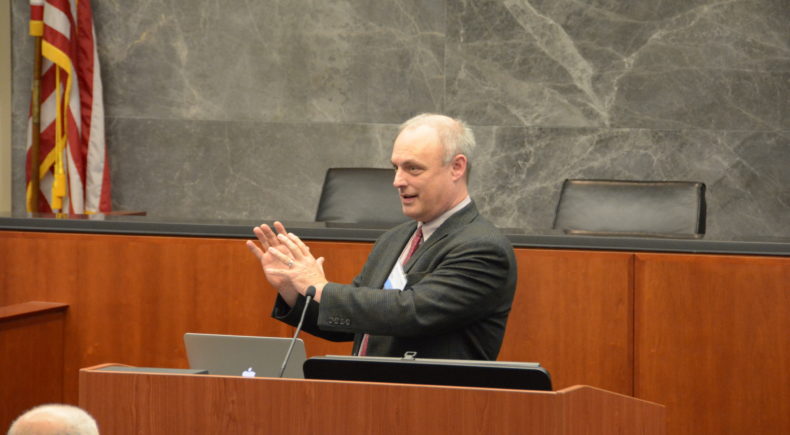Symposium 2017 | Prosecutorial Power
The George Washington Law Review’s Symposium, The Challenge of Crime in a Free Society: 50 Years Later, closed with a discussion of the role of prosecutorial power both in the criminal justice system generally and in the context of criminal justice reform. The panel included presentations from Angela Davis, Professor of Law at American University Washington College of Law; Adam Gershowitz, Associate Dean for Research and Faculty Development and Professor of Law at William & Mary Law School; Daniel Richman, Paul J. Kellner Professor of Law at Columbia Law School; and Ronald Wright, Needham Yancey Gulley Professor of Criminal Law at Wake Forest University School of Law. The discussion was moderated by Cynthia Lee, Charles Kennedy Poe Research Professor of Law at The George Washington University Law School.
Professor Angela Davis started the discussion with a familiar notion—that the most pressing problems in the criminal justice system are undue racial disparities and mass incarceration—but then proposed a more controversial idea: that prosecutors have an ethical duty to end mass incarceration. Professor Davis noted that while it is accurate to say that policies such as mandatory minimum sentences and the War on Drugs have led to the current crisis of mass incarceration, policies also do not implement themselves—instead, she argued, the choices that prosecutors have made in implementing these policies have been just as crucial a factor as the policies themselves in creating the crisis. In her view, given that roughly 95% of criminal cases end in plea bargains, prosecutors’ decisions about what charges to bring against defendants are the controlling force in the criminal justice system.
Touching on the 1967 Report’s call for prosecutors to use their broad discretionary powers more wisely, Professor Davis opted to take that call a step further, drawing on the Model Rules of Professional Responsibility to argue that prosecutors in fact have an ethical duty, deriving from their position as ministers of justice representing the public interests of the United States, to eliminate the crisis of mass incarceration. She had several proposals for how prosecutors could begin exercising this duty: she suggested that prosecutors should elect to bring charges only when necessary to protect the community from violent offenders, that prosecutors should drastically increase their commitment to the use of diversion, and that prosecutors’ offices should be invested in seeking clemency for incarcerated offenders who no longer pose a danger to the community. Professor Davis acknowledged that she was asking a lot of prosecutors, but she also stressed that prosecutors in the criminal justice system are given extraordinary power, and closed by reiterating the maxim that for those to whom much is given, much is asked.
Professor Adam Gershowitz followed up by suggesting that actually giving prosecutors more power, in certain ways, would help alleviate the problems of mass incarceration. He had three specific proposals: instituting procedures for prosecutors to pre-screen warrantless arrests by the police, requiring prosecutors to both notify police when they have dropped a case and to explain why they have done so, and empowering prosecutors to keep more data about the cases that they drop. In Professor Gershowitz’s view, given that the vast majority of criminal justice proceedings begin with some kind of police action, it makes sense for prosecutors, as those most invested in criminal justice proceedings, to be involved more extensively in advising the police.
In his own empirical research, Professor Gershowitz has found that prosecutors rarely offer police advice prior to an arrest, and as a result, weak cases are often brought by police and subsequently dismissed by prosecutors, which has the effect of burdening the criminal justice system with excessive volume and imposing stigma and costs on arrestees. Drawing on the example of Harris County, Texas, Professor Gershowitz argued that establishing “intake office” procedures, whereby no arrests are made without the consultation of a prosecutor, can help avoid the negative impacts of meritless cases. Acknowledging that the high costs of such a proposal would make most jurisdictions balk, Professor Gershowitz also proposed making prosecutors use case dismissals as “teachable moments”—he argued that requiring prosecutors to explain to police, in writing, why they have dropped a particular case would provide valuable feedback to officers tasked with applying complex legal standards to ambiguous situations. These kinds of reports would also benefit prosecutors, Professor Gershowitz argued, by allowing them to log and analyze data that would help identify potential “problem” officers or precincts that would benefit from enhanced oversight and training.
Professor Daniel Richman attempted to, in his words, “dial down the rhetoric,” arguing that proper study of the criminal justice system, as well as honest advocacy for criminal justice reform, requires disaggregation of the issues—to that end, he pointed to several areas in which this disaggregation would be valuable. First, he agreed that focusing on what segments of the population are ending up in prison is a good idea, but he also urged an inquiry into what crimes are driving the federal prison population and maintained that violent crimes drive the prison population to a greater degree than do drug crimes—in his view, honest advocacy for reducing the federal prison population then potentially requires taking the position that some violent offenders should receive shorter sentences, or that harsh sentences for violent crime should apply only in those localities that are experiencing high homicide rates.
Professor Richman also advocated for disaggregating analyses of the criminal justice system by county, given that the county is the basic unit of criminal prosecution across the states. Doing so, he argued, would mean that the analysis would change for every unit studied, making broad national policy solutions difficult to identify, but it would also have the advantage of potentially making the solutions to individual, localized problems more apparent. Undertaking more atomized studies of criminal justice problems, Professor Richman continued, may better reveal their root causes—for example, he suggested that such a study may reveal that a problem identified by Professor Davis (increased prosecutorial reliance on felony charging) may derive from the expansion of certain defendants’ criminal records, which in turn may be the result of the increased likelihood of contact with law enforcement for certain communities. Finally, Professor Richman closed with a soft pitch against transparency, observing that data collection is more of a means than an end, and that expanded collection of data can have the effect of retrenching systems of power if not engaged with and analyzed properly.
Professor Ronald Wright started by lauding the original 1967 Report’s vision of “prosecution on the record,” which would provide prosecutors and prosecutors’ offices with a robust set of standards to follow as they go about their profession, as well as allow policymakers to “look over the shoulder” of prosecutors and identify trends that need addressing. Some of the recommendations of the 1967 Report that Professor Wright considered particularly worthwhile were the suggestions that greater information be collected about the use of diversion, that prosecutors’ offices create checklists to guide individual prosecutors as they move through a case, and that results of plea negotiations be collected in a record. Professor Wright noted that some of this has come to pass: prosecutorial records have become much thicker, some state prosecutors’ offices have articulated explicit priorities for prosecutors to follow, and U.S Supreme Court rulings since the 1967 Report have incentivized the creation of a written record for plea negotiations.
Moving forward, Professor Wright sees recent developments in technology as particularly promising for fulfilling the vision of prosecution on the record—fairly mundane task-tracking software is making it increasingly easier to record day-to-day functions, which can create a robust record of how prosecutors are going about their practices and what activities are proving more or less successful. To Professor Wright, such technology should prove valuable both from a managerial perspective, as offices leverage these tools to discern best practices, and from a public accountability perspective, as policymakers have a chance to evaluate the effectiveness of different programs and ensure that prosecutors are abiding by and implementing the public’s priorities.
This summary was authored by Law Review member Max Loos.




